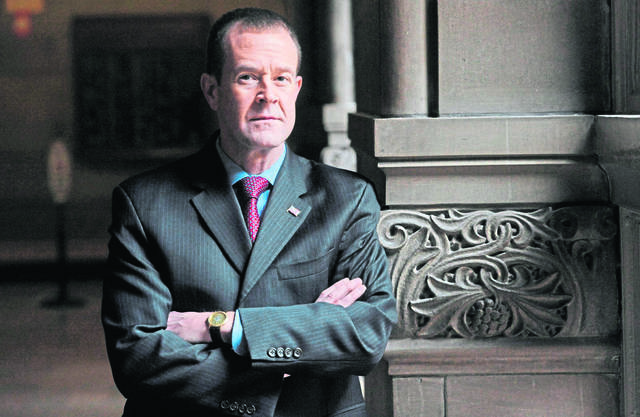Allegheny County Judge Tranquilli asks court to remove Ebonics claims in 2015 case
The attorney for Judge Mark V. Tranquilli, accused of misconduct and scheduled for trial before the Pennsylvania Court of Judicial Discipline, said that allegations his client spoke in Ebonics should be stricken from the case.
Matt Logue, who represents Tranquilli, filed pretrial motions in the case late Monday. Logue asks that expert testimony from a criminal justice professor be excluded from trial, as well as his own client’s investigative deposition.
Tranquilli, who was placed on administrative duties in February and then suspended without pay in August, is scheduled for trial on the matter Nov. 19 before Conference Judge John H. Foradora in Brookville, Jefferson County.
He is accused of six counts of misconduct, including that he engaged in “racial or other harassment,” and brought disrepute to the court.
The charges followed an investigation that began following a jury trial in January. At the end of the trial, Tranquilli took attorneys from both sides into chambers to discuss the case, and during that conversation, they said, he referred to one of the Black jurors on the case as “Aunt Jemima.”
Tranquilli said in an apology to his colleagues after charges were filed that he was referring to the a wrap the woman wore on her head.
Other allegations in the complaint included that Tranquilli spoke in Ebonics to a Black couple that came before him during custody conciliation in family court in August 2015. (Ebonics is an academic term for the speech of Black Americans.)
In his motion, Logue asked that those charges be excluded because they occurred outside of the board’s rules of procedure, which sets a time frame for complaints at four years.
The allegations referencing Ebonics were made by Tim Urich, who Logue wrote is an “admittedly biased attorney complainant.”
In an interview conducted of Urich by board investigator Tammie L. Kelley, Uhrich detailed “personal animus” against Tranquilli, Logue wrote.
He also said that despite what Urich reported to the board, both Urich and the parties in the case continued to go before Tranquilli multiple times afterward for custody conciliation.
Therefore, Logue continued, they “never sought [Tranquilli’s] recusal and never, at any time, made any allegations of any misconduct.”
In another motion, Tranquilli asks to exclude the testimony of criminal justice professor Shaun L. Gabbidon, who teaches at Penn State Harrisburg.
Gabbidon told Kelley during an interview on Sept. 10 that “the manner in which Judge Tranquilli is accused of using the term Aunt Jemima and of his speaking in Ebonics would ‘definitely’ be viewed as ‘racist attitudes’ that, in his opinion would ‘manifest itself during court proceedings.’”
Parties that would appear before him, the professor continued in his interview, would likely feel they couldn’t get a fair trial if they knew about Tranquilli’s comments.
“Gabbidon feels that if a [B]lack person knew about this type of language by a [j]udge, they would not want that judge to preside over his/her case, nor would their attorney, because it’s just one more obstacle to overcome in their defense,” Kelley wrote in her report.
Logue argues in his motion that Pennsylvania law prohibits an expert witness from offering an opinion as to guilt or innocence, which, he claims, Gabbidon does.
Further, Logue wrote, “the clear and uncontroverted empirical data of Judge Tranquilli’s sentencing statistics from the Pennsylvania Commission on Sentencing are not addressed by Professor Gabbidon, and this clear, scientific data belies Professor Gabbidon’s observations.”
Finally, Logue also filed a motion to exclude Tranquilli’s investigative deposition as evidence in the case, arguing that “the overwhelming majority of questioning” regarded matters outside of the board’s written notice, and also outside the allegations in the filed complaint.
In its own motion, the Judicial Conduct Board last week asked Foradora to preclude Tranquilli from offering into evidence the results of a polygraph examination he took, writing that such evidence is unreliable “due to the inherent unreliability” of them.
Motions will be heard in Brookville on Oct. 14.
Paula Reed Ward is a TribLive reporter covering federal and Allegheny County courts. She joined the Trib in 2020 after spending nearly 17 years at the Pittsburgh Post-Gazette, where she was part of a Pulitzer Prize-winning team. She is the author of “Death by Cyanide.” She can be reached at pward@triblive.com.
Remove the ads from your TribLIVE reading experience but still support the journalists who create the content with TribLIVE Ad-Free.

